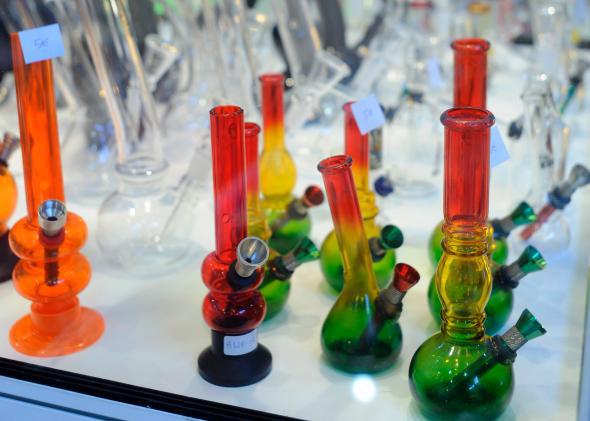This article originally appeared in Inc.
The Marijuana Show, which premiered online today (they couldn’t wait until 4:20 p.m.), isn’t your regular cutthroat reality show. It’s a little kinder and mellower strain than others in the genre.
The show is part The Apprentice, part Shark Tank, and part marijuana history lesson. Filmed in Denver, the capital of America’s legal pot industry, the first episode, “Hemp, Hemp, Hooray,” finds ganjapreneurs pitching co-creators, producers, and directors Wendy Robbins and Karen Paull for a spot on the show. Robbins and Paull filmed 20 episodes for Season 1 following the entrepreneurs from auditions and call backs through mentoring with pitch masters, lawyers, and investors during the show’s “Bud Camp.” At the end of the season, they begin helping the aspiring business owners land between $25,000 and $1 million in venture capital.
At the beginning of episode one, Robbins, the inventor of a head massager called The Tingler and the business mentor on Kelly Ripa’s reality series Homemade Millionaire explains why they created the show: “We’re bringing awesome people who are making a difference on the planet, that are incredible entrepreneurs, who have incredible ideas, but they can’t get access to banks, not yet at least.” (Even mature marijuana businesses are still dealing exclusively in cash because banks have not accepted business from marijuana-related companies.) Adds Paull, the CEO and founder of Sales Guru Consulting: “The next marijuana millionaire is waiting to audition and we’re going to help take them from seed to bank.”
Kyla Hill, the first entrepreneur to snag one of six spots on the show, is the founder of Washington, D.C.-based Hemp Butter All in One, an organic cannabis-based body butter. Hill says cannabis is high in essential fatty acids omega-3, 6, and 9, so the weed-laced moisturizer, although it doesn’t provide a high, will help your skin stay soft and smooth. Going into auditions, she says, she has already sold $10,000 worth of her product. Later in the series, Robbins and Paull challenge her to go out to 100 stores to get her hemp butter on the shelves.
Another entrepreneur at the audition, Kat Rhein, pitched a marijuana-friendly spa in Colorado called The Green Spa. Rhein said her weed-friendly getaway would be complete with massages, hot tubs, communal areas, and private camping areas. She said she would cater to Asian tourists who want to “experience the American lifestyle,” which apparently means getting daily massages while blazing. Alas, her pitch was a little disorganized and her business doesn’t exist yet, and she was a tad too emotional to be taken seriously. Her biggest fear, she explained through tears, was losing friends who disapproved of pot. Not to be a buzzkill here, but any investor looking to get a return wouldn’t fund an entrepreneur whose biggest fear isn’t failing, but losing judgmental friends. The Green Spa did not make it to the call-back round.
Halfway through the 12-minute episode was a segment about the history of cannabis prohibition. Snoop Dogg–approved Glendale, Colorado, mayor Mike Dunafon, who earlier this year ran unsuccessfully for governor against incumbent John Hickenlooper, might be the ballsiest politician in the U.S. A former player for the Denver Broncos, Dunafon takes viewers through facts like how the American colonies were mandated to grow hemp, America’s first flag was printed on hemp, and the Constitution was written on hemp paper. If you don’t believe him about the utility of cannabis, which can be used to make anything from buildings to dynamite to cellophane, read Popular Mechanics’ 1938 article on the “billion-dollar crop.” Dunafon could’ve gotten his point across more effectively without exhibiting the paranoia of a stoned conspiracy theorist, but facts are facts.
Dunafon tells how media mogul William Randolph Hearst, chemical magnate Lammot du Pont, and financier Andrew Mellon worked with politicians to make cannabis illegal using propaganda about how pot smokers—mainly Mexican and black men—turned into violent sex criminals. “What did Hearst and du Pont do? Hearst bought thousands of acres of woodland, du Pont had the chemicals to reduce it to newsprint,” he says. “Well, du Pont was coming out with nylon. So, what would happen if all your trees and all your chemicals became worthless or had to, in the marketplace, compete with hemp?”
The show is a little rough around the edges and a tad hokey, but it does have a sincere cause behind it. Besides its main goal of finding, mentoring, and funding marijuana entrepreneurs, it aims to educate people on the reasons cannabis was made illegal, and the positive impact a regulated industry could have on American cities like Denver. Between the propaganda film Reefer Madness, politicians linking marijuana use to Mexican immigrants and violence, and The Marijuana Tax Act of 1937, pot has been saddled with the stigma of a dangerous controlled substance.
But what would happen if it was made legal again nationwide? Robbins and Paull are betting that civilization won’t end, children won’t become drug fiends en masse, and skilled businessmen and women could help create jobs and make some money.
Below, watch the first episode of The Marijuana Show, before it’s available elsewhere online.
See also: Navigating the Pot Business
